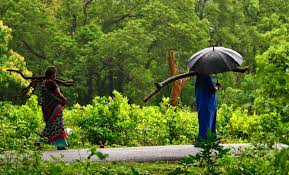PESA : Forest Conservation In India

The Panchayat (Extension to Scheduled Areas) Act (PESA) empowered Scheduled Tribes by mandating political representation in local governance, thereby linking their livelihood needs with forest conservation.
- The Panchayat (Extension to Scheduled Areas) Act (PESA) of 1996 extended Part IX of the Constitution, which pertains to Panchayats, to Scheduled Areas.
- These areas, defined under Article 244(1), receive special provisions under the Fifth Schedule of the Constitution.
- PESA mandates political representation for Scheduled Tribes (STs) in local governance, ensuring they have a significant role in decision-making regarding their resources and livelihoods.
- This act applies in ten states across India, covering various districts under the Fifth Schedule, aiming to empower ST communities economically and environmentally
- The conflict in conservation efforts in India centres on balancing conservation with local resource extraction and economic development.
- The government often prioritizes large-scale economic projects such as mining and dam construction over forest conservation, driven by the interests of the political elite.
Forest Rights Act, 2006, and PESA 1996:
Promoting Environmental Conservation:
- The Forest Rights Act recognizes and vests forest rights in the hands of forest-dwelling communities.
- By empowering these communities with ownership and access rights, FRA promotes sustainable forest management.
g. In Mendha Lekha, Maharashtra, tribal communities utilized FRA to gain control over their traditional forests. - The act emphasizes the conservation of biodiversity and ecological balance. By involving local communities in the conservation process, it contributes to maintaining diverse ecosystems.
- For instance, the Bishnois of Rajasthan, under the FRA, has played a crucial role in protecting the blackbuck, an endangered species.
- The act recognizes community forest rights, providing communities with the authority to protect and manage forests collectively. This communal approach fosters environmental conservation.
- The Dongria Kondh tribe in Odisha used FRA to protect the Niyamgiri Hills, a biodiversity hotspot.




